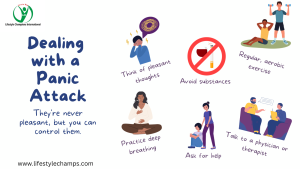Overcoming Panic Attacks: A Personal Experience
By Dr. Moyosore Makinde
How I developed Panic Attacks
Whew! It had been a full day at work and I was heading home or rather driving home. I envisaged a 2-3 hour drive ahead of me, but what could I do? Post-graduate training was a ‘must-accomplish’ for me. My residency training center was quite a distance from home, but having worked as a medical officer for four years after house-job and youth service, I was already feeling out of tune with my dreams for the future. The distance was not going to deter me.
Your Money or your life?
So I wound my way through the traffic, bumper-to-bumper in the historic Lagos traffic. It was already nearing dusk as I approached ‘Under-bridge Iyana-Ipaja’. Oblivious of whatever danger lay ahead, I listened to the radio, praying for the traffic to ease out. There was another lull in traffic just a few meters from the bridge when I suddenly heard a rough voice beside me. I turned my head and saw a middle-aged man, looking uncouth peering through my window which was wound up about halfway. I then realized who he was as he asked me to give him money. Incidentally, my car’s air-conditioning was faulty and the heat unbearable; at that point, I knew I had let down my guard by letting down my window. My bag was nowhere in sight, having hidden it under the car seat. I can’t remember where my phone was, probably in my bag.
Losing my Rings again?
I told him I did not have any money. The next thing he said was, “Give me your rings”. My head buzzed, “Not again”. My mind flashed back to a couple of years before, when I was robbed while on duty in the private hospital I worked. Almost 20 weeks pregnant, I was told to lie flat on my abdomen along with the nurses on duty. My wedding bands came off in a jiffy as these men pretending to be sick wreaked havoc in the hospital, robbing both staff and patients. Within milliseconds, I was back to reality, wondering how I could be losing another set of wedding rings. There were so many people milling around but no one seemed to notice my predicament as the robber stood beside my unmoving car. He said, “I will shoot you” and to back up his threat, brought out a gun from his pocket.
Saved by the Bell?
I was about to remove my rings as demanded when the “molue” in front of me moved. I likewise put my foot on the accelerator pedal and pushed it quickly. The car bolted forward but I didn’t brake fast enough. I heard a crash. People were shouting. I had bashed into two vehicles simultaneously; the “molue” and a yellow bus. I gushed with apologies and explained, “A man was trying to rob me”. Then the sympathy came from all angles as well as safety advice. I looked around. My stalker was gone with the wind. I finally arrived home safely but with a dent in my bonnet. Little did I realize the psychological impact of this occurrence on me.
Every single time I drove through Iyana-Ipaja after that, my windows were up, A/C working or not. What bothered me, however, was the way my heart fluttered in my chest every time someone walked beside my car. A sudden panic would rise in my throat and I could see the man asking for my rings. This continued for several months before I learned how to deal with it. I had two more similar threats on the same Lagos-Abeokuta express during my residency training.
Somewhere along the way, I learned that I was having panic attacks. I also learned how to manage my fraught emotions and the palpitations that came during those attacks. It also spiked my interest in mental health.
What is A Panic Attack?
A panic attack is referred to as a brief episode of intense anxiety associated with physical sensations of fear. This could occur even without any apparent danger or threat. Everyone has experienced a panic attack at least once in their lifetime. However, when it becomes recurrent and unpredictable, hindering one’s daily activities, then it is termed a panic disorder.

How to Overcome a Panic Attack
In case you are wondering what helped me manage a panic attack, you can do the following:
- Take deep breaths and exhale slowly. This sends a signal to the brain and activates the parasympathetic drive, thereby slowing the heart rate and calming anxiety symptoms.
- Engage in self-guided imagery by focusing your mind on pleasant, peaceful pictures of loved ones or nature scenes. Calming music and meditation on a quote, poem or scripture is also helpful. This will boost your happy hormones, called endorphins and relax you.
- Assure yourself that this attack is not life-threatening and that this too shall pass.
Lifestyle-related measures and Panic Attacks
To prevent further panic attacks, some lifestyle-related measures have been shown to play an important role:
- Engage in regular, aerobic exercise. This will help reduce feelings of stress and tension.
- Avoid foods that can worsen symptoms of a panic attack such as caffeine, alcohol and high sugary drinks.
- Read a self-help book or talk to a physician, therapist or counselor about your symptoms. Severe symptoms may require cognitive behavioral therapy or medication.
In conclusion, panic attacks are common occurrences that can be triggered by distressing circumstances. To prevent symptoms from escalating into a panic disorder, you can learn how to adopt these lifestyle-related measures which are evidence-based and effective.
Bibliography
1. Panic Disorder. https://www.nhs.uk/mental-health/conditions/panic-disorder/
2. Panic Disorder Treatment and Management. https://emedicine.medscape.com/article/287913-treatment
Dr. Moyosore Makinde is a Consultant Family Physician and Board-certified Lifestyle Medicine Physician. She is the National President of the Society of Lifestyle Medicine of Nigeria.
